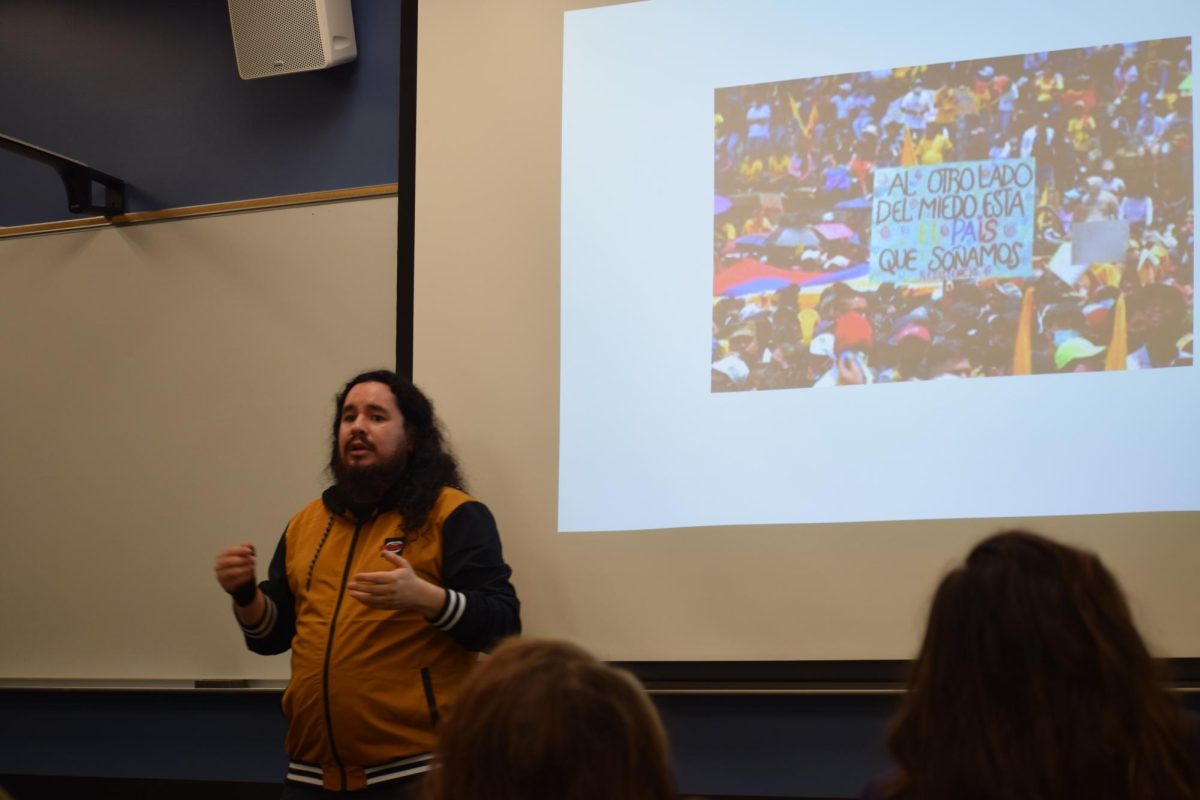California Lutheran University’s Department of Languages and Culture, and Ethnic and Race Studies began hosting its second annual Colombia at CLU event on Tuesday, Nov. 7 with a discussion on education in Colombia and student activism. It was the first of a two-week series of events.
Colombia at CLU, which began in 2022, was created as a way to engage scholars with the Latin American and particularly Colombian community. The event is spearheaded by Loren Munoz, program director for the ethnic and race studies program and associate professor at Cal Lutheran, and is a combined initiative between Colombian scholars and Cal Lutheran faculty.
“As an HSI, I think it’s important to bring a diversity of Latine communities because oftentimes we are seeing a homogenous, like we are all the same and we’re not. We’re incredibly different,” Munoz said.
The event on Nov. 7 consisted of two speakers, Daniel Hernandez, a graduate student in natural resource science and management at the University of Minnesota, and Alexandra Chocontá a gender, women and sexuality studies graduate student at the University of Minnesota.
“That idea led to ethnic and race studies inviting these young scholars to come here and talk about their experiences in graduate school and to present their research in Spanish and to have this experience,” Munoz said.
According to Munoz, both Hernandez and Chocontá participated in last year’s event, and with the help of a grant written by Hernandez, they were able to come back to Cal Lutheran and participate in the two-week event this year.
“Daniel Hernandez actually is an assistant professor at Universidad Iberoamericana in Colombia. He also directs or engages with the internationalization of that university, so he wrote grants to be able to come here at no cost to us,” Munoz said. “Instead of doing a week like last year, we were able to do Colombia at CLU 2023, and have two weeks of events and they are very different.”
Last year, Munoz said the event was held in Spanish, and monolingual speakers wore headsets with live translations to immerse themselves in the conversation. The main topic of discussion at the presentation was student issues in Colombia, with a specific focus on how students express political and social activism.
Hernandez began the event by presenting the social movements driven by Colombian students, and Chocontá followed by focusing on how feminism and gender inequality impacted student movements.
Both Chocontá and Hernandez said it is important for students of all backgrounds to learn about Colombia’s history because it creates a catalyst for discussion on social and political activism on an international stage.
“It can create relationships and friendships. If, for instance, students talk with their families tonight they can say ‘I heard a talk about Colombia’, ‘I had never known anything about Colombia’, or ‘I haven’t thought about this,’” Chocontá said. “So they talk with their families and the next time they hear about Colombia they will remember us. It can create some sort of awareness and social allies.”
While Chocontá’s studies focus on feminism through a Colombian lens, Hernandez said he was passionate about teaching students social movements, particularly public policy advocacy that concerns indigenous people.
“For me, it’s important that people hear or have a point of contact with other points of view about Colombia because we are not only Pablo Escobar, we are not only drugs, we are not only terrorists. We are more than the bad ideas of Colombia,” Hernandez said.
Hernandez said the presentations were created with the intention of providing students with critical perspectives on social and political movements and structures that differ greatly from the United States.
The presentations were followed by a Q&A, in which audience members asked questions to learn more information about specific traditions, norms and practices that are common in Colombia.
According to Munoz, the exchange of information and ideas was the ultimate goal of Colombia at CLU.
“I’m really excited about this because this provides a particular framework that then we can, in consecutive years, do the same for other areas of the world. It’s always great to learn from areas and ideologies, and even ways that people see the world in different places,” Munoz said.
As part of the program exchange, Munoz and two other faculty members will fly to Bogota, Colombia on Nov. 17 and provide lectures on their areas of expertise to the students of the Universidad Iberoamericana.
Upcoming Colombia at CLU events include a cultural exchange roundtable and a series of research presentations on Wednesday, Nov. 15.






